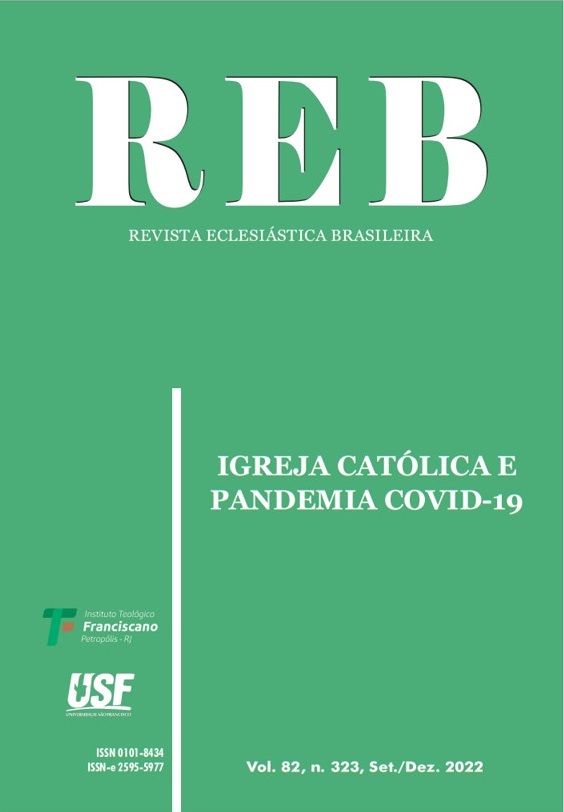O retorno de Deus e da religião no mundo pós-secular
DOI:
https://doi.org/10.29386/reb.v82i323.4427Resumo
Este trabalho pretende ser uma contribuição para o debate atual sobre a pós-secularização. Partindo das teses de David Martin, Charles Taylor e Hans Joas, na primeira parte do ensaio são apresentadas algumas contribuições que, ao mesmo tempo em que mostram os limites da interpretação laica da religião, procuram abrir brechas para o debate, de uma maneira nova. Segundo Martin, existe uma espécie de miopia nos partidários da secularização que não nos permite apreender as aporias da ligação entre a modernização e o declínio da vitalidade religiosa. Por seu turno, Taylor identifica nas guerras religiosas do século XVII, desencadeadas na Europa após as tensões provocadas pela Reforma, uma das razões para a diminuição da intensidade da crença e da prática religiosa e, por conseguinte, da crescente indiferença para com o sagrado. Segundo Joas, após o nascimento das religiões universais, o desenvolvimento da cultura dos direitos humanos representa a segunda grande onda histórica de uma dessacralização radical do poder e se confunde com a gênese da opção laica. Na segunda parte deste estudo apresentamos algumas reflexões que mostram os novos caminhos que a religião está trilhando na era pós-secular. Assim, passamos da ideia do teólogo Dotolo, segundo a qual a pós-secularidade reinventou o sagrado na linha de uma criatividade incessante, capaz de valorizar uma espiritualidade mais flexível e arejada, desconectada de qualquer referência a princípios e normas, para o pensamento de Bechert, que, na primeira parte de sua obra, apontou como, entre as grandes religiões, o budismo desempenha hoje um papel protagonista no cenário da pesquisa religiosa, pelo fato de nela o elo entre a soteriologia e a ética constituir as coordenadas de referência para um caminho de reapropriação pelo homem de si mesmo. E, a última parte de sua obra mostra como, na realidade, o debate sobre a religião está aberto a novos cenários, muitas vezes de difícil interpretação.
Palavras-chave: Secularização; Religião; Deus; Pós-moderno.
Abstract: This work is intended to be a contribution to the current debate on post-secularization. Starting from the theses of David Martin, Charles Taylor and Hans Joas, in the first part of the essay some contributions are presented which, while showing the limits of the secular interpretation of religion, on the other hand try to open doors to set the debate in a new way. According to Martin, there is a sort of myopia in the supporters of secularization that does not allow us to grasp the aporias of the link between modernization and the decline of religious vitality. On the other hand, Taylor identifies in the religious wars of the seventeenth century, unleashed in Europe after the tensions caused by the reform, one of the reasons for the decrease in intensity of religious belief and practice and, therefore, the growing indifference towards the sacred. According to Joas, after the birth of universal religions, the development of the culture of human rights represents the second great historical wave of a radical desacralization of power and it is intertwined with the genesis of the secular option. In the second part of this study we presented some reflections that show the new paths that religion is following in the post-secular age. Thus we pass from the idea of the theologian Dotolo according to which post-secularity has reinvented the sacred along the lines of an incessant creativity capable of enhancing a more flexible, airy spirituality, disconnected from any reference to principles and norms, to thought of Bechert who pointed out that, among the great religions, it is Buddhism that plays the leading role in the scenario of religious research today, due to the fact that in it the link between soteriology and ethics constitutes the reference coordinates for a journey of reappropriation by man of his own self. The last part of the work shows how, in reality, the debate on religion is open to new scenarios that are often difficult to interpret.
Keywords: Secularization; Religion; God; Post-modern.
Downloads
Downloads
Publicado
Como Citar
Edição
Seção
Licença
Copyright (c) 2022 Revista Eclesiástica Brasileira

Este trabalho está licenciado sob uma licença Creative Commons Attribution 4.0 International License.
Os autores cedem os direitos autorais; como gratificação, a REB oferece dois exemplares ao Autor de um artigo.
A REB adere à licença não comercial (Creative Commons). Portanto, é permitida cópia, distribuição e exibição dos textos, respeitados os direitos autorais e citada a fonte de sua proveniência.


